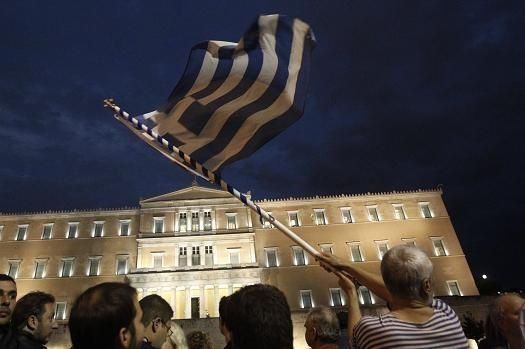Greece Faces Off With Hedge Fund Investors Ahead Of Buyback Scheme

Hedge funds are playing a dangerous game of chicken with Greece this week, according to insider sources quoted in various financial media outlets, a game whose denouement could devastate plans to keep Greece in the euro zone.
It’s all coming out now as a result of a plan, whose details were announced Monday, that seeks to use $10 billion in bailout funds provided by the International Monetary Fund to buy almost three times that amount in outstanding Greek debt. The move would nearly halve the amount of government debt that is currently in private investor hands, some $63 billion, and reduce the amount of total debt owed by the country. And its execution is being set as a precondition by the IMF to disburse the next round of rescue funds.
Yet in spite of the fact that the swap would value Greek debt at around 32 cents on the dollar, at a massive premium as to where that debt had been trading in previous weeks and months, some fund managers are planning to hold out, calculating whatever they have left over after the successful completion of the deal will be worth even more, perhaps as much as 40 cents on the dollar.
“People have fallen in love with their profits, and they have lost touch with the downside,” Petros Christodoulou, a top executive at the National Bank of Greece who presided over an earlier restructuring, told the New York Times. “If this thing fails, there is total collapse, and the price goes to 20 cents.”
The chances that such a failure will occur are not entirely out of the realm of possibility. Greece’s banks, which hold a large portion of the Greek debt to be sold in the buyback, are expected to be major players in the deal. But since any losses they take as part of the plan will have to be covered by the national government, they can’t be the only ones to participate.
"It's like a poker game. You need to understand what everyone else is going to do first," Achilles Risvas, chief executive officer of hedge fund Dromeus Capital, told Reuters, noting he himself would not be enticed to sell his funds’ holdings of Greece’s debt at prices less than 35 cents on the dollar.
Julian Adams, CEO at Adelante Asset Management, agreed investors had incentives to hold out for higher prices, also telling Reuters: "We may tender at the higher end of the range but have not decided yet. There does not seem to be much downside in not participating."
Various insider sources reported negotiations were going on Thursday to have Greece offer a higher price on its buyback. The Wall Street Journal cited an unnamed Greek official saying response by foreigners to the offer was "going well" so far, but that “things could change.”
It would be disastrous if they do.
In advance of the possibility anything might go awry, the deal-rating agency Standard and Poor’s announced Thursday it now considered Greece to be in “selective default.”
(Even though the buyback program is voluntary, S&P sees it as coerced given its failure would make Greece lose the next round of international aid.)
Now sit back and see how this tightrope act ends.
© Copyright IBTimes 2024. All rights reserved.





















